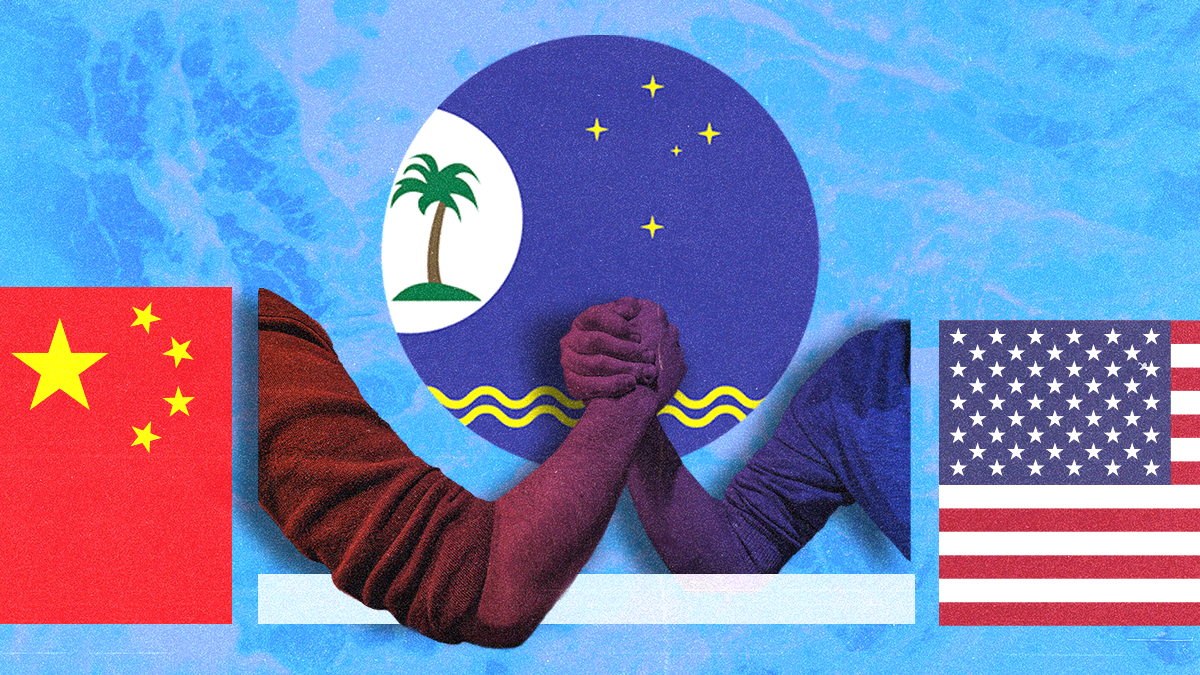Alarmed by China’s progress in extending its influence among a series of strategically located islands in the middle of the Pacific Ocean, this week President Joe Biden is hosting the first-ever US-Pacific Island Country Summit in Washington, DC. The White House has invited the leaders of 12 Pacific nations to discuss climate change, economic cooperation, and security ties. We asked Eurasia Group expert Peter Mumford to explain the importance of the event.
Why hold the summit now?
After taking office in early 2021, the Biden administration initially focused its Indo-Pacific diplomatic efforts on longstanding allies Japan and South Korea, as well as on wooing India and strengthening the Quad, a grouping of the US, Japan, India, and Australia. In the second half of the year, it ramped up its engagement with Southeast Asia.
Now it is turning its focus to the Pacific Islands, partly in response to increased Chinese assertiveness in the region and the warnings of a concerned Australia, a key US ally.
One recent development that set off alarm bells was a security pact between China and the Solomon Islands that entails broad police and military cooperation. Beijing this year also tried, unsuccessfully, to form a regional economic and security pact with ten Pacific countries.
Some Pacific countries say America has neglected them for a long time – is that true?
Broadly, yes. At the Pacific Islands Forum Leaders Meeting in July, Vice President Kamala Harris took an important step toward healing wounded feelings. Speaking over a video link, she said: “We recognize that in recent years, the Pacific Islands may not have received the diplomatic attention and support that you deserve. So today I am here to tell you directly: We are going to change that.”
What do Pacific countries want from the US, and what is the US willing to offer them?
First and foremost, these countries want the US to show up and engage with them. To that end, the US is reopening its embassy in the Solomon Islands and plans to establish two new missions in the region, in Tonga and Kiribati; Washington will also, for the first time, appoint a US envoy to the Pacific Islands Forum.
Beyond that, Pacific countries want help mitigating the effects of climate change. Several nations lie just a few meters above sea level. Fiji Defense Minister Inia Seruiratu said at the Shangri-La Dialogue in Singapore in June: "In our Blue Pacific continent, machine guns, fighter jets, gray ships, and green battalions are not our primary security concern. The single greatest threat to our very existence is climate change."
In July, Harris said that US assistance to the region — to help strengthen climate resilience, improve marine planning and conversation, address illegal fishing, and enhance maritime security — would be tripled to $60 million per year for the next decade, subject to approval by Congress. The US Agency for International Development also plans to re-establish a regional mission in Suva, Fiji.
Why has China been expanding its own engagement with the region?
The Pacific Islands are composed of many small nations, each with a vote at the UN, providing an attractive opportunity for China to expand its international support.
Beijing is also seeking to further constrain Taiwan’s diplomatic space, given that the Pacific Islands are home to four of the remaining 14 nations that formally recognize Taiwan. China has already convinced several Pacific countries to switch their diplomatic recognition from Taiwan to China, most recently the Solomon Islands and Kiribati in 2019. That said, Taiwan’s four remaining allies — the Marshall Islands, Tuvalu, Palau, and Nauru — say they are standing firm.
The Pacific Islands region is also an important part of China’s goal to project naval power further afield by finding new friendly nations to offer safe harbor to Chinese military vessels.
Why does this outreach concern the US?
Beijing’s increasing engagement in the Pacific Islands poses a number of implications for US military interests, including the potential encirclement of allies Australia and New Zealand.
In addition, as China increases its economic engagement, including through the Belt and Road Initiative, Pacific Island countries may feel more beholden to Beijing and side with it at international fora. Washington is also concerned that China’s growing influence could weaken democracy and governance in the region.
Who is winning the scramble for the Pacific?
Until recently, it seemed China had the upper hand, with much more intense diplomatic and economic engagement. But Beijing has suffered several setbacks recently, such as the failure of the new economic and security pact, and rising apprehension over involvement in BRI projects worldwide.
Meanwhile, the US is re-engaging, and its support for regional identities strikes a chord in the region. Similarly, Australia has scored some success in its efforts to convince Pacific Island countries not to use the equipment of Chinese telecoms giant Huawei.
The challenge for the US, though, is to sustain engagement with a far-flung region at a time when it has many priorities to juggle, several of which are more pressing. China will always be able to devote more financial resources and deploy senior visitors to the region more often than the US can. Yet the US’s network of alliances and partnerships can compensate for this disadvantage. Especially important is the role played by Australia, which is by far the largest aid donor to the Pacific Islands, the Quad grouping, and the recently launched US-led Partners in the Blue Pacific initiative, which includes Australia, Japan, New Zealand, and the UK as well as other observer countries.
This article comes to you from the Signal newsletter team of GZERO Media. Sign up today.
